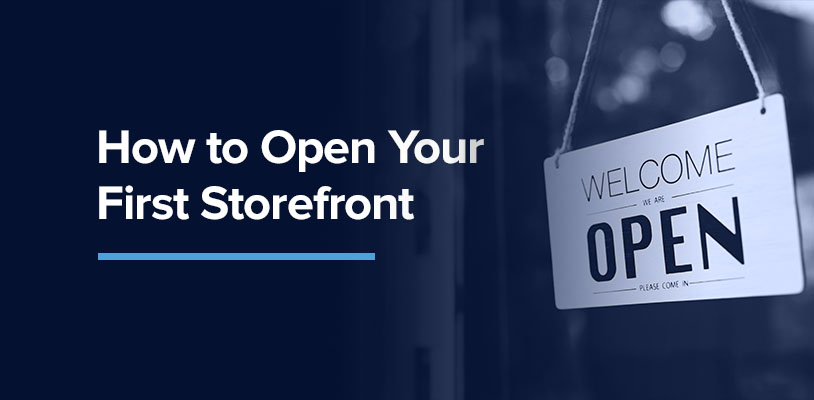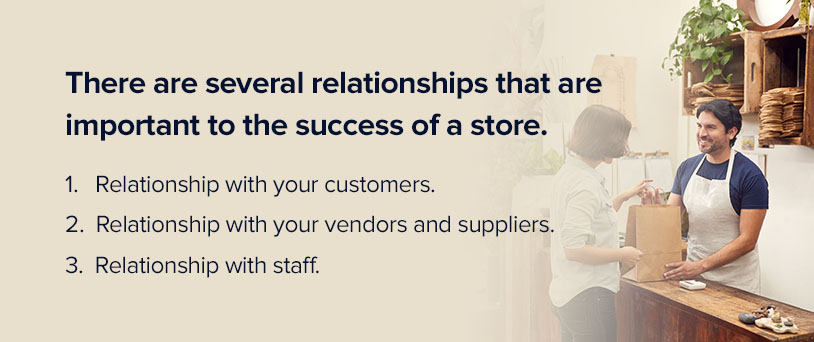How to Open Your First Storefront

There’s nothing like in-store shopping. It’s an engaging, tangible, and often social experience that people have enjoyed for centuries. From the markets of ancient Mesopotamia to today’s department stores, humans continue to buy and sell goods face-to-face. The emergence of e-commerce has raised questions about the future of brick-and-mortar stores, but research still indicates that consumers prefer purchasing at physical stores as opposed to online.
Many shoppers will browse items on the web, but at the end of the day, images and descriptions just can’t replicate the selling power of putting a product in a person’s hands. That makes opening a brick-and-mortar store a viable and thrilling business opportunity. There are many things to consider when opening a shop, so here’s a step-by-step checklist on how to open a retail store.
1. Brainstorm Ideas to Find Your Niche
The first thing you’ll need to do is decide what you’re going to sell. While that advice may be rather obvious, it can be surprisingly difficult to settle on a final idea. Often, people tend to find themselves in one of two camps — they either have too many ideas or none at all.
If you find yourself without any ideas, it’s time to brainstorm, which is a process where you write down every possible idea you can imagine. When you brainstorm, no idea is too big or too small — it’s all about getting thoughts out of your head and onto paper. Sometimes, recording even the whackiest idea can make room in your mind for something brilliant.
Once you’ve written down a list of ideas, you should eliminate anything obviously nonsensical or uninteresting. Look for common themes or ideas that especially pique your interest. Consider categories or related products to see whether you could group ideas together. Start to imagine how you could shape your thoughts into a unique and niche business or product.
In the end, you should have a better idea of the best type of store to open.
2. Create a Business Plan
Of course, opening a store is more than just picking a product. There are many moving parts to a business, and it’s important to ask questions like:
- Who is my target audience?
- Who is my competition?
- What are my operational expenses?
- How will I price my products and/or services?
- How am I going to market my business?
If you intend to find investors or get a loan from the bank, they’re going to ask the same questions. That’s where a business plan comes in. This plan lays out a roadmap for your business. In oversimplified terms, it outlines what you want to sell and how you intend to make money doing it.
As you start working on your business plan, you’ll want to dig in and learn as much as you can about the market, your competition, pricing models, and marketing methods. Then, you’ll compile your research into a comprehensive document designed to persuade an investor, a bank, or even yourself that your venture is plausible and potentially profitable.
3. Register Your Business Name
Choosing a strong business name can help define your brand long-term and create a sense of identity for your store. Here are some characteristics you should consider when making your selection:
- Originality: Make sure your business name isn’t already being used or trademarked. A quick internet search should help.
- Clarity: A business name should be easy for customers to understand and recognize. Some brands can get away with vague names, but it’s often best to let your name do some of the leg work for you. Even Apple started out as Apple Computer Company.
- Brevity: When you think of iconic brands, their names tend to be short and sweet — Google, Amazon, Facebook, Nike, Starbucks, and Walmart are a few examples. Though you may not be able to pull off a one-word name right away, you may not want your business to be a mouthful.
- Longevity: Choose a business name that gives you room to grow. If you make it too specific or on-the-nose, it may be hard to branch out and expand your business in the future. Strike a balance between something vague and something direct to find the sweet spot for your brand’s identity.
Once you settle on a name, it’s time to register it with local, state, and federal agencies. If the name isn’t your business legal name, it’ll be registered as a “doing business as,” or DBA. Don’t forget to buy a domain name for your business’s website and create new social media accounts.
4. Take Care of Legal Items
There are some other legal requirements for opening a retail store you must meet before opening your doors. First, you’ll need to decide on your business’s legal structure, whether it be a sole proprietorship, a limited liability company (LLC), or another designation. Then, you’ll want to register your business entity with the proper city, county, and state offices.
Talk to your local and state clerks about what licenses, tax registration, and permits you’ll need to obtain. At the least, you’ll likely need to get a general business license and a tax registration, but sometimes, there are other permit requirements, too. Ask about the requirements for components like:
- Building and occupancy permits
- Regulated activity permits
- Professional permits
- Industry permits
Don’t forget about business insurance, either. Typically, it’s a good idea for shop owners to consider general liability insurance, a business owner’s policy, and business crime insurance. If you plan to hire employees, you may be required to carry workers’ compensation insurance, employee health insurance, and unemployment insurance, as well.
5. Find a Retail Store Location
Once your legal affairs are in order, you’re ready for an exciting step — leasing your first store location. This is the part of the process where your business idea finally gets some real, tangible roots. That’s why it’s so important to pick the right place. After all, it’s all about location, location, location!
Choosing well can make or break your bottom line. Ultimately, you’ll want a store that receives great foot traffic, is visible from popular roadways, has accessible parking, and is located where your target audience likes to spend their time. These parameters give you built-in marketing that can save you advertising dollars.
At Brand Reach Retail Partners, we know all about what goes into finding a retail store to lease. With our repertoire of available leasing locations, we’ll be able to help you find the spot that can set you up for success. Whether you’re looking for a lease, need the expertise of a brokerage, want help with property management, or need to acquire tenant representation, Broad Reach Retail is ready to assist you.
6. Have Soft and Grand Openings
Depending on your business or industry, you may want to consider doing an opening event. There are two typical opening options — soft openings and grand openings.
A soft opening is where you open the store to the public but don’t make any formal announcements — you quietly open your doors, hang an open sign and allow people to flow in naturally. The idea behind it is to prepare the staff and store for the grand opening, giving you time to slowly ease into opening your business.
In contrast, the grand opening is the day you pull out all the stops. Break out the balloons, refreshments, door prizes, or specials to attract anyone and everyone to walk through your doors. The primary goal is to introduce your store to your community and to give them a chance to experience your store. Of course, it’s also a celebration of what you’ve achieved in opening your first store.
7. Establish Relationships
There are several relationships that are important to the success of a store.
The first is your relationship with your customers. The power of a recommendation can’t be understated — and it also can’t be directly purchased. Though it takes time and attention to build a good reputation, it starts with the way you treat your customers.
Another crucial relationship is the one you establish with your vendors and suppliers. Finding a trustworthy and reliable supplier can be paramount to keeping products stocked and affordable. By doing your due diligence and favoring relationships over price, you’ll develop an invaluable partnership that can lead to new merchandise, product scalability, and cost savings.
Lastly, you want to establish a healthy relationship with staff. The people you hire will most likely be people from the community, meaning the way you treat them will trickle out through their connections. Treating your customers with respect while taking advantage of your staff fosters resentment. By providing flexible work hours, competitive wages, and simply showing your employees you care about the work they do for you, you can establish your business as a place where people want to work.
8. Hire Staff and Find the Right Systems
Though they say good help is hard to find, it’s worth your time and energy to do just that. Part of establishing good relationships with your staff is to bring in the right people in the first place. A high turnover rate can be costly for your business, so take the time you need to find suitable applicants. Be selective, and do your best to attract the kind of people you want to make up your team.
Another powerful asset for running a store successfully is choosing the right point-of-sale (POS) system. This is the technology and processing program that facilitates transactions, so it should be easy to use for both your staff and the customer, the two parties that are going to be using it on a day-to-day basis. A POS system will need to accept various forms of payment to accommodate all customers.
9. Take Care of Your Finances
A business is meant to make money, so you’ll need to be organized with your finances from the start. The first thing you’ll need to do is open a business checking account. If you’ve taken out a loan at a bank, you may want to set up an account with them for ease of use. If not, choose a bank with small business benefits or opt for a local bank to keep things community-centric.
Once you have a business checking account, you’ll need to keep records on how you use it. This account should only ever be used for business purposes. Next, you’ll want to apply for a business credit card. Often, you can apply for them online, but you can shop around for the best interest rates and incentives before you commit to one.
When you have your accounts and cards set up for your store, you’ll want to invest in some bookkeeping software. There are many options that can keep track of your business checking account, credit cards, profit and revenue, expenses, and more. Hiring a freelance or part-time bookkeeper could help you run your store more successfully.
10. Work on Retail Marketing
Once you open your business, you’ll need to market it to keep customers coming through your doors. Try out numerous ideas while keeping track of how much business they bring in. Ask customers how they heard about you to gauge which marketing avenues are the most lucrative. Additionally, attend community events, advertise in other stores, and cultivate relationships with local business owners.
One of the most important steps you can take is to establish a website and social media presence. Most consumers are inclined to research shops online before they ever step foot in the store, so your internet presence needs to make a good impression. These days, social media is just as important as having a solid website, so you’ll want to consider social media marketing, too.
After you’ve set up your website and social media pages, invest time into cultivating them with pictures and branding materials. Then, engage with the online community — respond to comments, take reviews seriously, run polls, and offer special discounts. This effort will help you reach as many customers as possible.
Work With Brand Reach Retail Partners to Open Your First Store
Starting a new business is an exciting venture. Taking on the risk to follow your dreams is a worthy goal, but you don’t have to do it alone. Brand Reach Retail is here to help you navigate the opening of your business — our services are designed to support you and help you navigate the ins and outs of store ownership. As a privately held, fully integrated owner and operator of shopping centers, we can offer you a number of essential services to help you on your business journey.
How can you open your own store? Partner with a business that puts other business owners first. To learn more about our services or find a local listing that’s right for you, contact us today!



